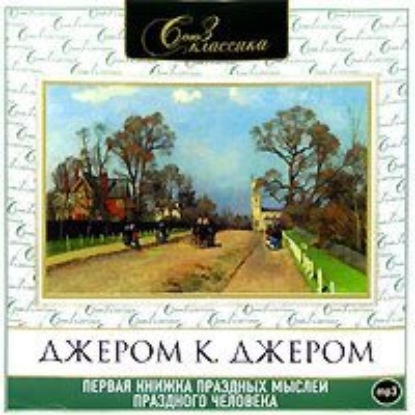
Полная версия
The Idle Thoughts of an Idle Fellow
We want to think of women not– as their own sex would show them– as Lorleis luring us to destruction, but as good angels beckoning us upward. They have more power for good or evil than they dream of. It is just at the very age when a man's character is forming that he tumbles into love, and then the lass he loves has the making or marring of him. Unconsciously he molds himself to what she would have him, good or bad. I am sorry to have to be ungallant enough to say that I do not think they always use their influence for the best. Too often the female world is bounded hard and fast within the limits of the commonplace. Their ideal hero is a prince of littleness, and to become that many a powerful mind, enchanted by love, is “lost to life and use and name and fame. ”
And yet, women, you could make us so much better if you only would. It rests with you, more than with all the preachers, to roll this world a little nearer heaven. Chivalry is not dead: it only sleeps for want of work to do. It is you who must wake it to noble deeds. You must be worthy of knightly worship.
You must be higher than ourselves. It was for Una that the Red Cross Knight did war. For no painted, mincing court dame could the dragon have been slain. Oh, ladies fair, be fair in mind and soul as well as face, so that brave knights may win glory in your service! Oh, woman, throw off your disguising cloaks of selfishness, effrontery, and affectation! Stand forth once more a queen in your royal robe of simple purity. A thousand swords, now rusting in ignoble sloth, shall leap from their scabbards to do battle for your honor against wrong. A thousand Sir Rolands shall lay lance in rest, and Fear, Avarice, Pleasure, and Ambition shall go down in the dust before your colors.
What noble deeds were we not ripe for in the days when we loved? What noble lives could we not have lived for her sake? Our love was a religion we could have died for. It was no mere human creature like ourselves that we adored. It was a queen that we paid homage to, a goddess that we worshiped.
And how madly we did worship! And how sweet it was to worship! Ah, lad, cherish love's young dream while it lasts! You will know too soon how truly little Tom Moore sang when he said that there was nothing half so sweet in life. Even when it brings misery it is a wild, romantic misery, all unlike the dull, worldly pain of after-sorrows. When you have lost her– when the light is gone out from your life and the world stretches before you a long, dark horror, even then a half-enchantment mingles with your despair.
And who would not risk its terrors to gain its raptures? Ah, what raptures they were! The mere recollection thrills you. How delicious it was to tell her that you loved her, that you lived for her, that you would die for her! How you did rave, to be sure, what floods of extravagant nonsense you poured forth, and oh, how cruel it was of her to pretend not to believe you! In what awe you stood of her! How miserable you were when you had offended her! And yet, how pleasant to be bullied by her and to sue for pardon without having the slightest notion of what your fault was! How dark the world was when she snubbed you, as she often did, the little rogue, just to see you look wretched; how sunny when she smiled! How jealous you were of every one about her! How you hated every man she shook hands with, every woman she kissed– the maid that did her hair, the boy that cleaned her shoes, the dog she nursed– though you had to be respectful to the last-named! How you looked forward to seeing her, how stupid you were when you did see her, staring at her without saying a word! How impossible it was for you to go out at any time of the day or night without finding yourself eventually opposite her windows! You hadn't pluck enough to go in, but you hung about the corner and gazed at the outside. Oh, if the house had only caught fire– it was insured, so it wouldn't have mattered– and you could have rushed in and saved her at the risk of your life, and have been terribly burned and injured! Anything to serve her. Even in little things that was so sweet. How you would watch her, spaniel-like, to anticipate her slightest wish! How proud you were to do her bidding! How delightful it was to be ordered about by her! To devote your whole life to her and to never think of yourself seemed such a simple thing. You would go without a holiday to lay a humble offering at her shrine, and felt more than repaid if she only deigned to accept it. How precious to you was everything that she had hallowed by her touch– her little glove, the ribbon she had worn, the rose that had nestled in her hair and whose withered leaves still mark the poems you never care to look at now.
And oh, how beautiful she was, how wondrous beautiful! It was as some angel entering the room, and all else became plain and earthly. She was too sacred to be touched. It seemed almost presumption to gaze at her. You would as soon have thought of kissing her as of singing comic songs in a cathedral. It was desecration enough to kneel and timidly raise the gracious little hand to your lips.
Ah, those foolish days, those foolish days when we were unselfish and pure-minded; those foolish days when our simple hearts were full of truth, and faith, and reverence! Ah, those foolish days of noble longings and of noble strivings! And oh, these wise, clever days when we know that money is the only prize worth striving for, when we believe in nothing else but meanness and lies, when we care for no living creature but ourselves!
On being in the blues
I can enjoy feeling melancholy, and there is a good deal of satisfaction about being thoroughly miserable; but nobody likes a fit of the blues. Nevertheless, everybody has them; notwithstanding which, nobody can tell why. There is no accounting for them. You are just as likely to have one on the day after you have come into a large fortune as on the day after you have left your new silk umbrella in the train. Its effect upon you is somewhat similar to what would probably be produced by a combined attack of toothache, indigestion, and cold in the head. You become stupid, restless, and irritable; rude to strangers and dangerous toward your friends; clumsy, maudlin, and quarrelsome; a nuisance to yourself and everybody about you.
While it is on you can do nothing and think of nothing, though feeling at the time bound to do something. You can't sit still so put on your hat and go for a walk; but before you get to the corner of the street you wish you hadn't come out and you turn back. You open a book and try to read, but you find Shakespeare trite and commonplace, Dickens is dull and prosy, Thackeray a bore, and Carlyle too sentimental. You throw the book aside and call the author names. Then you “shoo” the cat out of the room and kick the door to after her. You think you will write your letters, but after sticking at “Dearest Auntie: I find I have five minutes to spare, and so hasten to write to you,” for a quarter of an hour, without being able to think of another sentence, you tumble the paper into the desk, fling the wet pen down upon the table-cloth, and start up with the resolution of going to see the Thompsons. While pulling on your gloves, however, it occurs to you that the Thompsons are idiots; that they never have supper; and that you will be expected to jump the baby. You curse the Thompsons and decide not to go.
By this time you feel completely crushed. You bury your face in your hands and think you would like to die and go to heaven. You picture to yourself your own sick-bed, with all your friends and relations standing round you weeping. You bless them all, especially the young and pretty ones. They will value you when you are gone, so you say to yourself, and learn too late what they have lost; and you bitterly contrast their presumed regard for you then with their decided want of veneration now.
These reflections make you feel a little more cheerful, but only for a brief period; for the next moment you think what a fool you must be to imagine for an instant that anybody would be sorry at anything that might happen to you. Who would care two straws (whatever precise amount of care two straws may represent) whether you are blown up, or hung up, or married, or drowned? Nobody cares for you. You never have been properly appreciated, never met with your due deserts in any one particular. You review the whole of your past life, and it is painfully apparent that you have been ill-used from your cradle.
Half an hour's indulgence in these considerations works you up into a state of savage fury against everybody and everything, especially yourself, whom anatomical reasons alone prevent your kicking. Bed-time at last comes, to save you from doing something rash, and you spring upstairs, throw off your clothes, leaving them strewn all over the room, blow out the candle, and jump into bed as if you had backed yourself for a heavy wager to do the whole thing against time. There you toss and tumble about for a couple of hours or so, varying the monotony by occasionally jerking the clothes off and getting out and putting them on again. At length you drop into an uneasy and fitful slumber, have bad dreams, and wake up late the next morning.
At least, this is all we poor single men can do under the circumstances. Married men bully their wives, grumble at the dinner, and insist on the children's going to bed. All of which, creating, as it does, a good deal of disturbance in the house, must be a great relief to the feelings of a man in the blues, rows being the only form of amusement in which he can take any interest.
The symptoms of the infirmity are much the same in every case, but the affliction itself is variously termed. The poet says that “a feeling of sadness comes o'er him. ” 'Arry refers to the heavings of his wayward heart by confiding to Jimee that he has “got the blooming hump. ” Your sister doesn't know what is the matter with her to-night. She feels out of sorts altogether and hopes nothing is going to happen. The every-day young man is “so awful glad to meet you, old fellow,” for he does “feel so jolly miserable this evening. ” As for myself, I generally say that “I have a strange, unsettled feeling to-night” and “think I'll go out. ”
By the way, it never does come except in the evening. In the sun-time, when the world is bounding forward full of life, we cannot stay to sigh and sulk. The roar of the working day drowns the voices of the elfin sprites that are ever singing their low-toned miserere in our ears. In the day we are angry, disappointed, or indignant, but never “in the blues” and never melancholy. When things go wrong at ten o'clock in the morning we– or rather you– swear and knock the furniture about; but if the misfortune comes at ten P. M., we read poetry or sit in the dark and think what a hollow world this is.
But, as a rule, it is not trouble that makes us melancholy. The actuality is too stern a thing for sentiment. We linger to weep over a picture, but from the original we should quickly turn our eyes away. There is no pathos in real misery: no luxury in real grief. We do not toy with sharp swords nor hug a gnawing fox to our breast for choice. When a man or woman loves to brood over a sorrow and takes care to keep it green in their memory, you may be sure it is no longer a pain to them. However they may have suffered from it at first, the recollection has become by then a pleasure. Many dear old ladies who daily look at tiny shoes lying in lavender-scented drawers, and weep as they think of the tiny feet whose toddling march is done, and sweet-faced young ones who place each night beneath their pillow some lock that once curled on a boyish head that the salt waves have kissed to death, will call me a nasty cynical brute and say I'm talking nonsense; but I believe, nevertheless, that if they will ask themselves truthfully whether they find it unpleasant to dwell thus on their sorrow, they will be compelled to answer “No. ” Tears are as sweet as laughter to some natures. The proverbial Englishman, we know from old chronicler Froissart, takes his pleasures sadly, and the Englishwoman goes a step further and takes her pleasures in sadness itself.
I am not sneering. I would not for a moment sneer at anything that helps to keep hearts tender in this hard old world. We men are cold and common-sensed enough for all; we would not have women the same. No, no, ladies dear, be always sentimental and soft-hearted, as you are– be the soothing butter to our coarse dry bread. Besides, sentiment is to women what fun is to us. They do not care for our humor, surely it would be unfair to deny them their grief. And who shall say that their mode of enjoyment is not as sensible as ours? Why assume that a doubled-up body, a contorted, purple face, and a gaping mouth emitting a series of ear-splitting shrieks point to a state of more intelligent happiness than a pensive face reposing upon a little white hand, and a pair of gentle tear-dimmed eyes looking back through Time's dark avenue upon a fading past?
I am glad when I see Regret walked with as a friend– glad because I know the saltness has been washed from out the tears, and that the sting must have been plucked from the beautiful face of Sorrow ere we dare press her pale lips to ours. Time has laid his healing hand upon the wound when we can look back upon the pain we once fainted under and no bitterness or despair rises in our hearts. The burden is no longer heavy when we have for our past troubles only the same sweet mingling of pleasure and pity that we feel when old knight-hearted Colonel Newcome answers “adsum” to the great roll-call, or when Tom and Maggie Tulliver, clasping hands through the mists that have divided them, go down, locked in each other's arms, beneath the swollen waters of the Floss.
Talking of poor Tom and Maggie Tulliver brings to my mind a saying of George Eliot's in connection with this subject of melancholy. She speaks somewhere of the “sadness of a summer's evening. ” How wonderfully true– like everything that came from that wonderful pen– the observation is! Who has not felt the sorrowful enchantment of those lingering sunsets? The world belongs to Melancholy then, a thoughtful deep-eyed maiden who loves not the glare of day. It is not till “light thickens and the crow wings to the rocky wood” that she steals forth from her groves. Her palace is in twilight land. It is there she meets us. At her shadowy gate she takes our hand in hers and walks beside us through her mystic realm. We see no form, but seem to hear the rustling of her wings.
Even in the toiling hum-drum city her spirit comes to us. There is a somber presence in each long, dull street; and the dark river creeps ghostlike under the black arches, as if bearing some hidden secret beneath its muddy waves.
In the silent country, when the trees and hedges loom dim and blurred against the rising night, and the bat's wing flutters in our face, and the land-rail's cry sounds drearily across the fields, the spell sinks deeper still into our hearts. We seem in that hour to be standing by some unseen death-bed, and in the swaying of the elms we hear the sigh of the dying day.
A solemn sadness reigns. A great peace is around us. In its light our cares of the working day grow small and trivial, and bread and cheese– ay, and even kisses– do not seem the only things worth striving for. Thoughts we cannot speak but only listen to flood in upon us, and standing in the stillness under earth's darkening dome, we feel that we are greater than our petty lives. Hung round with those dusky curtains, the world is no longer a mere dingy workshop, but a stately temple wherein man may worship, and where at times in the dimness his groping hands touch God's.
On being hard up
It is a most remarkable thing. I sat down with the full intention of writing something clever and original; but for the life of me I can't think of anything clever and original– at least, not at this moment. The only thing I can think about now is being hard up. I suppose having my hands in my pockets has made me think about this. I always do sit with my hands in my pockets except when I am in the company of my sisters, my cousins, or my aunts; and they kick up such a shindy– I should say expostulate so eloquently upon the subject– that I have to give in and take them out– my hands I mean. The chorus to their objections is that it is not gentlemanly. I am hanged if I can see why. I could understand its not being considered gentlemanly to put your hands in other people's pockets (especially by the other people), but how, O ye sticklers for what looks this and what looks that, can putting his hands in his own pockets make a man less gentle? Perhaps you are right, though. Now I come to think of it, I have heard some people grumble most savagely when doing it. But they were mostly old gentlemen. We young fellows, as a rule, are never quite at ease unless we have our hands in our pockets. We are awkward and shifty. We are like what a music-hall Lion Comique would be without his opera-hat, if such a thing can be imagined. But let us put our hands in our trousers pockets, and let there be some small change in the right-hand one and a bunch of keys in the left, and we will face a female post-office clerk.
It is a little difficult to know what to do with your bands, even in your pockets, when there is nothing else there. Years ago, when my whole capital would occasionally come down to “what in town the people call a bob,” I would recklessly spend a penny of it, merely for the sake of having the change, all in coppers, to jingle. You don't feel nearly so hard up with eleven pence in your pocket as you do with a shilling. Had I been “La-di-da,” that impecunious youth about whom we superior folk are so sarcastic, I would have changed my penny for two ha'pennies.
I can speak with authority on the subject of being hard up. I have been a provincial actor. If further evidence be required, which I do not think likely, I can add that I have been a “gentleman connected with the press. ” I have lived on 15 shilling a week. I have lived a week on 10, owing the other 5; and I have lived for a fortnight on a great-coat.
It is wonderful what an insight into domestic economy being really hard up gives one. If you want to find out the value of money, live on 15 shillings a week and see how much you can put by for clothes and recreation. You will find out that it is worth while to wait for the farthing change, that it is worth while to walk a mile to save a penny, that a glass of beer is a luxury to be indulged in only at rare intervals, and that a collar can be worn for four days.
Try it just before you get married. It will be excellent practice. Let your son and heir try it before sending him to college. He won't grumble at a hundred a year pocket-money then. There are some people to whom it would do a world of good. There is that delicate blossom who can't drink any claret under ninety-four, and who would as soon think of dining off cat's meat as off plain roast mutton. You do come across these poor wretches now and then, though, to the credit of humanity, they are principally confined to that fearful and wonderful society known only to lady novelists. I never hear of one of these creatures discussing a menu card but I feel a mad desire to drag him off to the bar of some common east-end public-house and cram a sixpenny dinner down his throat– beefsteak pudding, fourpence; potatoes, a penny; half a pint of porter, a penny. The recollection of it (and the mingled fragrance of beer, tobacco, and roast pork generally leaves a vivid impression) might induce him to turn up his nose a little less frequently in the future at everything that is put before him. Then there is that generous party, the cadger's delight, who is so free with his small change, but who never thinks of paying his debts. It might teach even him a little common sense. “I always give the waiter a shilling. One can't give the fellow less, you know,” explained a young government clerk with whom I was lunching the other day in Regent Street. I agreed with him as to the utter impossibility of making it elevenpence ha'penny; but at the same time I resolved to one day decoy him to an eating-house I remembered near Covent Garden, where the waiter, for the better discharge of his duties, goes about in his shirt-sleeves– and very dirty sleeves they are, too, when it gets near the end of the month. I know that waiter. If my friend gives him anything beyond a penny, the man will insist on shaking hands with him then and there as a mark of his esteem; of that I feel sure.
There have been a good many funny things said and written about hardupishness, but the reality is not funny, for all that. It is not funny to have to haggle over pennies. It isn't funny to be thought mean and stingy. It isn't funny to be shabby and to be ashamed of your address. No, there is nothing at all funny in poverty– to the poor. It is hell upon earth to a sensitive man; and many a brave gentleman who would have faced the labors of Hercules has had his heart broken by its petty miseries.
It is not the actual discomforts themselves that are hard to bear. Who would mind roughing it a bit if that were all it meant? What cared Robinson Crusoe for a patch on his trousers? Did he wear trousers? I forget; or did he go about as he does in the pantomimes? What did it matter to him if his toes did stick out of his boots? and what if his umbrella was a cotton one, so long as it kept the rain off? His shabbiness did not trouble him; there was none of his friends round about to sneer him.
Being poor is a mere trifle. It is being known to be poor that is the sting. It is not cold that makes a man without a great-coat hurry along so quickly. It is not all shame at telling lies– which he knows will not be believed– that makes him turn so red when he informs you that he considers great-coats unhealthy and never carries an umbrella on principle. It is easy enough to say that poverty is no crime. No; if it were men wouldn't be ashamed of it. It's a blunder, though, and is punished as such. A poor man is despised the whole world over; despised as much by a Christian as by a lord, as much by a demagogue as by a footman, and not all the copy-book maxims ever set for ink stained youth will make him respected. Appearances are everything, so far as human opinion goes, and the man who will walk down Piccadilly arm in arm with the most notorious scamp in London, provided he is a well-dressed one, will slink up a back street to say a couple of words to a seedy-looking gentleman. And the seedy-looking gentleman knows this– no one better– and will go a mile round to avoid meeting an acquaintance. Those that knew him in his prosperity need never trouble themselves to look the other way. He is a thousand times more anxious that they should not see him than they can be; and as to their assistance, there is nothing he dreads more than the offer of it. All he wants is to be forgotten; and in this respect he is generally fortunate enough to get what he wants.
One becomes used to being hard up, as one becomes used to everything else, by the help of that wonderful old homeopathic doctor, Time. You can tell at a glance the difference between the old hand and the novice; between the case-hardened man who has been used to shift and struggle for years and the poor devil of a beginner striving to hide his misery, and in a constant agony of fear lest he should be found out. Nothing shows this difference more clearly than the way in which each will pawn his watch. As the poet says somewhere: “True ease in pawning comes from art, not chance. ” The one goes into his “uncle's” with as much composure as he would into his tailor's– very likely with more. The assistant is even civil and attends to him at once, to the great indignation of the lady in the next box, who, however, sarcastically observes that she don't mind being kept waiting “if it is a regular customer. ” Why, from the pleasant and businesslike manner in which the transaction is carried out, it might be a large purchase in the three per cents. Yet what a piece of work a man makes of his first “pop. ” A boy popping his first question is confidence itself compared with him. He hangs about outside the shop until he has succeeded in attracting the attention of all the loafers in the neighborhood and has aroused strong suspicions in the mind of the policeman on the beat. At last, after a careful examination of the contents of the windows, made for the purpose of impressing the bystanders with the notion that he is going in to purchase a diamond bracelet or some such trifle, he enters, trying to do so with a careless swagger, and giving himself really the air of a member of the swell mob. When inside he speaks in so low a voice as to be perfectly inaudible, and has to say it all over again. When, in the course of his rambling conversation about a “friend” of his, the word “lend” is reached, he is promptly told to go up the court on the right and take the first door round the corner. He comes out of the shop with a face that you could easily light a cigarette at, and firmly under the impression that the whole population of the district is watching him. When he does get to the right place he has forgotten his name and address and is in a general condition of hopeless imbecility. Asked in a severe tone how he came by “this,” he stammers and contradicts himself, and it is only a miracle if he does not confess to having stolen it that very day. He is thereupon informed that they don't want anything to do with his sort, and that he had better get out of this as quickly as possible, which he does, recollecting nothing more until he finds himself three miles off, without the slightest knowledge how he got there.












